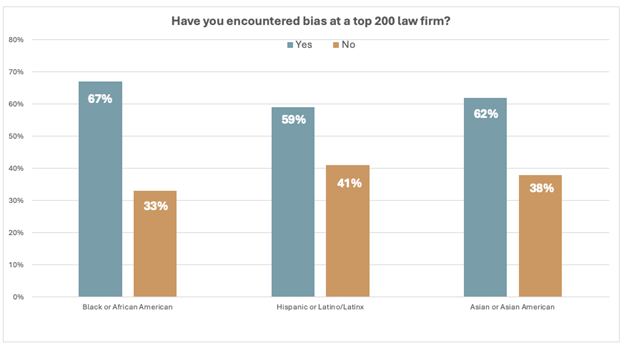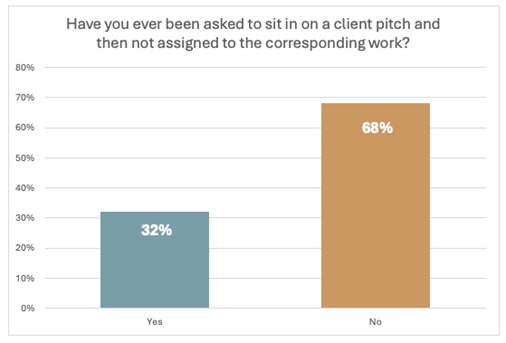[ad_1]
Again in March, ATL partnered with our buddies on the main authorized intelligence supplier, Leopard Solutions, on a survey of various attorneys at Biglaw corporations. The survey netted 643 distinctive responses, spanning demographics, and the outcomes had been illuminating. On June 6 at 12 p.m. ET, there shall be a webinar dedicated to exploring and analyzing the survey’s findings. Register here.
The survey particularly sought responses from attorneys in underrepresented teams, leveraging Leopard’s in depth database to succeed in the target market.* Contributors recognized as 59% feminine and 39% male. Different demographic particulars:
- Black or African American attorneys made up the most important bloc of respondents (31%)
- Asian or Asian American attorneys had been the second largest group (29%)
- Hispanic or Latino/Latinx attorneys represented 17%
- Eight % recognized with two or extra races
- A majority of the survey pool had been associates (60%), whereas 29% had been companions (virtually evenly cut up between fairness and non-equity)
General, 62% of responding attorneys reported encountering bias at an Am Regulation 200 agency, although it’s value noting that solely two-thirds of the attorneys surveyed answered this query. Amongst those that did reply, girls had been extra possible than males to come across bias: 66% in comparison with 58%. Black or African American attorneys reported the very best degree of racial bias (67%), adopted by Asian or Asian American respondents (62%) and Hispanic or Latino/Latinx attorneys (59%).

“My variety was used to win the pitch, however then the work by no means adopted.”
When requested to share examples of biases encountered, responses ran the gamut from implicit bias to marginalization to exclusion from plum assignments. One manifestation of this reported bias was the phenomenon of “window dressing,” the place various attorneys are requested to sit down on a consumer pitch after which not assigned to the accompanying work.
Almost a 3rd of respondents (32%) attested to having had this expertise. In 85% of those cases, the work involved their respective follow space. Black-identifying attorneys skilled this at a disproportionate charge (39%), six share factors above the common. This “window dressing” phenomenon shouldn’t be new to the business, however its pervasiveness has not beforehand been quantified.
When requested to elaborate on these disappointing experiences, solutions had been illuminating:
Occurs on a regular basis. The consumer has variety necessities or could be Black, so they need a Black individual within the assembly to safe the work. The work is available in, I don’t learn about it, and it goes elsewhere, normally to a non-diverse individual.

Agency “field checking” forward of an RFP was a recurring theme amongst open-ended responses, the place a number of attorneys revealed that their picture had been included on a pitch deck with out their prior information. Additionally they voiced considerations about frequent journey as a part of pitch groups, highlighting the dearth of compensation for his or her contributions to profitable enterprise.
At occasions, consumer strain does have a optimistic affect on the work out there to various attorneys: 29% of survey-takers stated they had been conscious of being assigned work as the results of a consumer request for extra various illustration. Amongst these surveyed, Black attorneys led this area, with 37% answering “sure” to the query.
However, these calling for the onus to be on the purchasers to be the brokers of change within the business could be stunned to find that some corporations are circumventing consumer requests. “I used to be beforehand at a midsize regional agency that was severely missing in ethnic variety,” one respondent reported. “The purchasers referred to as them out on it, in order that they started to rent African Individuals and people who recognized as Hispanic. Nonetheless, when the work got here in, they’d not enable these various people to work on the information.”
For extra insights into various attorneys’ experiences in Biglaw, please be a part of us on June 6 at 12 p.m. ET for the webinar, “Diversity in Law: Unraveling Diverse Attorneys’ Impact on the Industry.”
__________
* The survey used Leopard Options’ subtle instruments to vet the chance of variety by means of a number of key determinants.
[ad_2]
Source link


